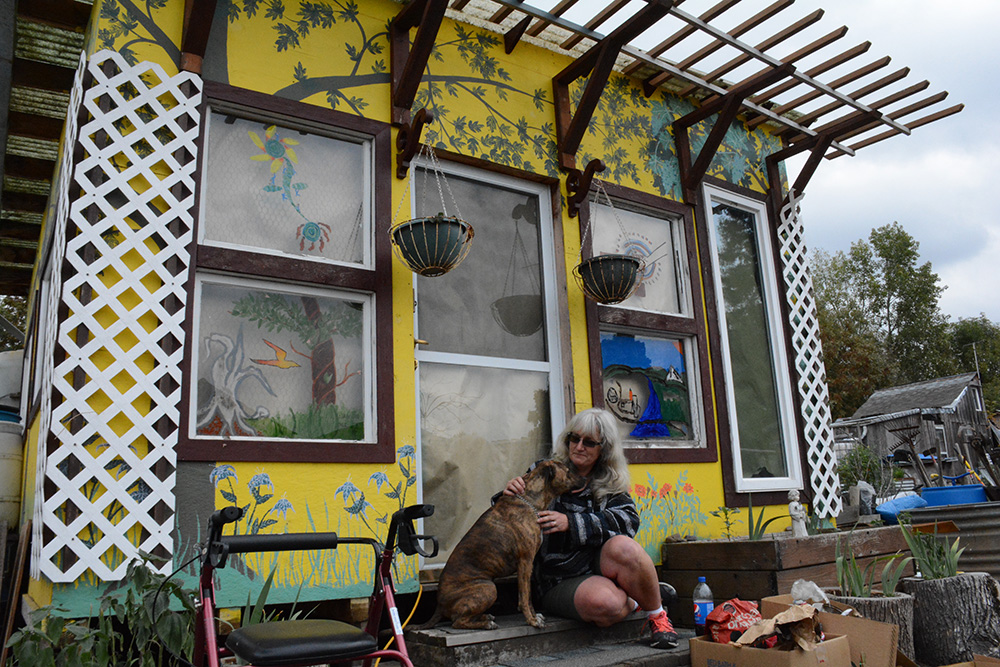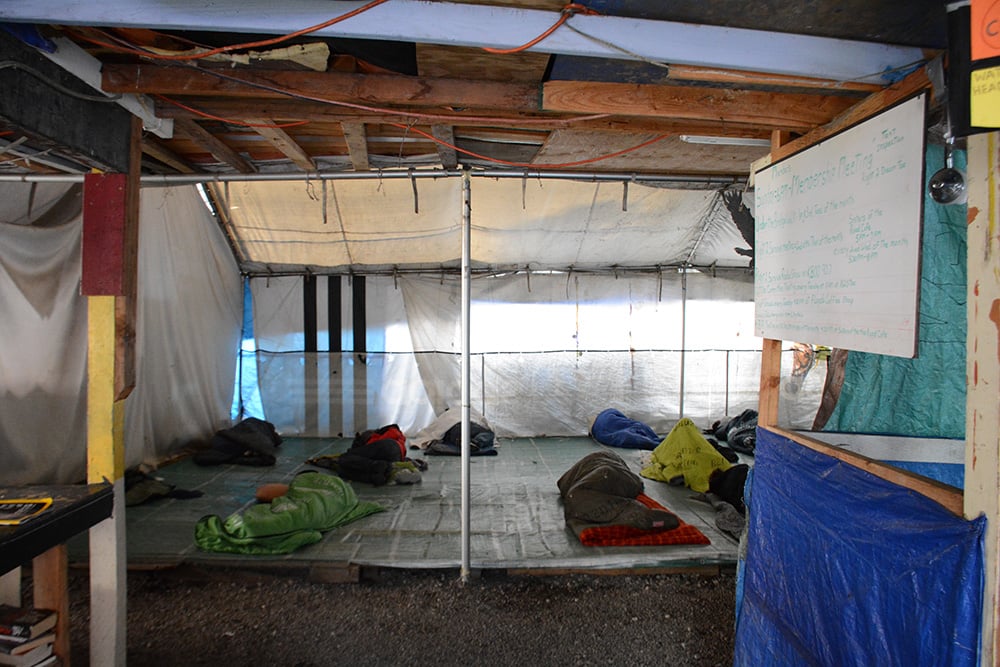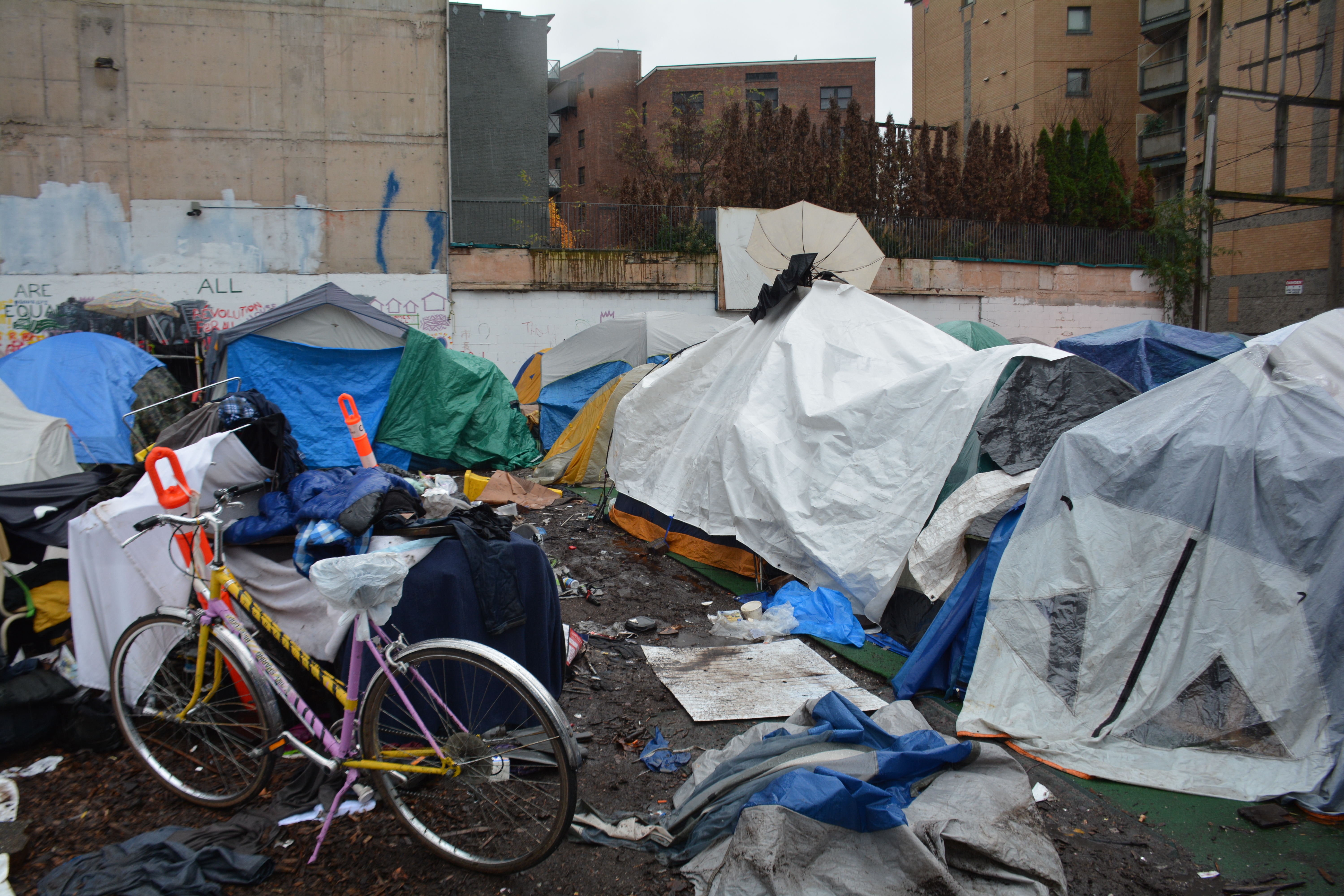The proliferation of homeless encampments is a direct result of the housing crisis. They’re the developed-country equivalent of the shanty town, the infill of vacant lots and spare ground with collections of tents sheltering people with nowhere else to go.
And until recently — indeed often still — they are viewed as a nuisance on the civic landscape, especially in places that bank on their beautiful visual appeal. Officialdom’s usual response has been to try to “clean up” tent encampments, using police to move their tenants along. Or worse.
But attitudes to encampments are changing. In Portland and Seattle, authorities are conceding that for some, no better options exist. Vancouver and Victoria too are eyeing the possible opening-up of a new and more positive relationship with campers previously regarded as unwanted vagrants.
After Seattle declared a state of housing emergency last year, city authorities, operating four days a week with two operations per day, conducted as many as 600 “sweeps” of homeless camps. Officials not only forced people to fold their tents and move, but at times seized and destroyed their belongings.
“The stories are really devastating,” said Yurij Rudensky, an attorney who advocates for the homeless in Seattle with Columbia Legal Services. “We’ve heard of people who have lost very sentimental items such as the only photograph of a biological family. People left out in the cold in the Seattle winter, without a tent and sleeping bag, shivering under a blanket and getting pneumonia. It’s really, really detrimental.”
Tactics used to drive out campers have sometimes been extreme. Abbotsford, B.C., used its bylaw powers to try to evict homeless people. When that didn’t get rid of them, the city resorted to spreading chicken manure on their camps, pepper spraying, destroying or trashing tents and personal property.
The harassment led campers to enlist help from the Pivot Legal Society, which took their case to the B.C. Supreme Court. It ruled that when Abbotsford prohibited outdoor sheltering, it had breached the campers’ rights under the Charter of Rights and Freedoms.
As DJ Larkin, the Pivot lawyer who represented the campers, put it, the court ruled that the city had an obligation to ensure that space exists, on an overnight basis, “where people can sleep, shelter, stay warm, eat and attend to personal hygiene.”
Joining beats fighting
After years of waging similar battles, the cities of Portland and Seattle are taking a different tack: working with the camps that have dug their heels into the ground.
Portland led the way in 2001 by allowing Dignity Village, a protest tent city, to set up camp on a city lot approximately 11 kilometres outside downtown. It now accepts that camp and a second one that appeared in 2011, Right 2 Dream Too (better known among its tenants as R2D2), as permanent features — for the present at least.

The Oregon city defines an organized camp as a group of people that has entered into a “temporary use” agreement or permit with the city for leased or owned space; has an agreed-upon code of conduct; and is provided with additional supports by the city such as trash pickup and portable toilets.
Oregon already had a 1995 state statute that required authorities to provide notice and store personal belongings when they removed tent encampments. Portland and its county have expanded that protection to create “a legal framework that would treat [a tent city] as just another form of shelter,” according to Marc Jolin, an initiative director with the county who is keeping it focused on the plan to end homelessness.
The change, he said, came from a broader “out of doorways” movement advocating for the homeless. “In essence, [campers] said, you know, let us show you that we can be good neighbours.”
Miles outside the downtown core, near the international airport, Dignity Village went from tents to tiny home structures that individual residents decorate to make their own. Right outside the gates of Portland’s Chinatown and next to a bustling intersection, R2D2 is half emergency shelter, where people borrow blankets and sleep in groups under a tarp until they choose to become members and live in a tent in the other half.
Seattle, responding to 57 deaths of homeless people on its streets last year, has made a similar peace with tent cities. It now provides sanitation services such as garbage pickup and portable toilets to 10 authorized encampments.
Three are managed by Share/Wheel, a non-profit organization run by and for people who are or were homeless. Each of Share/Wheel’s camps shelter as many as 50 to 100 people. Seven others are independent.
Services vary but most encampments provide portable toilets, a generator and blankets if needed, as well as distribute donated food, tents, clothes and hygiene supplies. While some also offer a shower and bus tickets, all have a “front desk” in a more permanent structure open 24/7 for any issues that arise. The tent cities allow pets, and unlike shelters, allow couples to stay together.
But they also require residents to share security shifts, attend weekly meetings, and sometimes pick up trash in the wider community to demonstrate neighbourly effort. Some require background checks and government ID, but all have codes of conduct that residents must follow to stay in the tent city.
Give tents a chance
By giving homeless encampments a chance to operate, Seattle and Portland have also empowered campers.
Ron Corey, who was living in Portland’s R2D2 camp when we met, had been there six months. He moved to the city from Salem to be closer to his daughter, but had nowhere to live. He says he found R2D2’s support a welcome experience. Noting the emergency shelter space for men, women and mixed-gender couples that sits in front of the small collection of members’ tents, he said the camp’s Homeless Bill of Rights helps people claim their place in an increasingly unaffordable world.

“We stand up for people who are not standing up for themselves,” Corey said. But, he emphasized, “We’re peaceful. We really want to work with the police. It’s not us against them, it’s us with them.”
Three hours up I-5, the idea of empowerment is part of what keeps Matthew Hannahs going at the Nickelsville Ballard tent encampment in a mixed commercial-residential area of Seattle.
“When we first wanted to come here, there was a big uproar, it was huge,” Hannahs said. “Then once we actually moved in, they found how quiet we were. If we see that people have graffitied on the side of businesses in town, we’ll offer to come by and paint over that.”
Hannahs said the camp has “been able to prove all the naysayers wrong.”
Most authorized encampments occupy commercial land leased by the city, government property, or empty church sites near transit and services. Portland’s Dignity Village leases city property for free and has an annual operating budget of about US$23,000, not including food.
Seattle budgeted US$100,000 for its first seven authorized homeless camps last year, and set aside between $5,000 and $7,000 more for administrative setup costs when it announced three more to shelter up to 100 people each. Food, clothing and even tents are donated by the public or non-profit organizations.
The now-legal camps have invited the public to come in and take a look at how they’re being run. Relationships are growing between campers and the authorities, police and neighbours.
While there is no perfect tracking of people who live in authorized camps, the three that Share/Wheel operates in Seattle saw 57 residents move to transitional or permanent conventional housing between Oct. 1, 2015 and June 28 this year. Thirty more moved into other shelter, 40 found employment, and three were reunited with relatives during the same period. That’s out of roughly 250 residents living across the three encampments at any one time, a number that fluctuates as people move on to housing or other shelter.
Models for BC
Homeless campers in Canada would like to see the same movement here.
Members of a protest camp that sprung up this summer on West Hastings Street in Vancouver are pushing for tent cities to be allowed to govern themselves, and say they want to collaborate with authorities to avoid confrontations and closure. They keep the gate to the lot they occupy open for police and fire officials to deal with safety concerns.
One of the first campers on the site, and one of its former co-organizers, was Laura Shaver. She preferred a tent to one of the area’s SROs — a single-room occupancy hotel — where “a lot of people are fighting with bugs, the rats — not having hot water, not having working toilets. We have a better toilet here than in some of the buildings.”
The camp offered a social embrace. “We have different meetings at night, as a community, when we’re having dinner,” said Shaver in the beginning, who is president of both the Vancouver Area Network of Drug Users and the B.C. Association for People on Methadone.
“People feel like they’re involved: they have decisions in how we do things here. That’s big. When you feel it’s your own and you’re part of making the policies and guidelines, it changes how people treat things,” she said about the camp’s beginning.
Vancouver’s not entirely onside yet. Its mayor, Gregor Robertson, has announced plans to turn the campers’ lot at 58 West Hastings into an affordable housing building with a health centre inside. But in late October, as the situation at the camp deteriorated, the city moved to dismantle it. By the beginning of November, it filed a court injunction to allow the city and police to dismantle the last few remaining tents. The next court hearing is set for Nov. 14.

The city continues to sweep up tents that pop up in Oppenheimer Park, in the city’s Downtown Eastside, after closing down an earlier camp that set up there in 2014.
Vancouver’s ambivalent compromise echoes Victoria’s. Before a protest camp calling itself Super InTent City appeared there last fall, B.C.’s capital was already mulling a multi-pronged approach to a regional shelter crisis.
Victoria Mayor Lisa Helps called it “the crisis in our parks,” as about 130 people were sleeping out in them on any given night. In July 2015, councillors considered a temporary initiative to select one park, Topaz Park, as a designated sheltering site. But a few weeks later the proposal was dismissed.
Shortly after, Super InTent City raised its poles on open ground right beside Victoria’s court house. It folded them 10 months later, after the provincial government purchased a former care home for $11.2 million and moved in the majority of campers.
It was seen as a victory for the protesters — who wound up with permanent housing. But the City of Victoria was left with a $1.6-million bill, most of that for extra police officers at the site. It’s spent another $1.1 million so far this year policing people still sleeping in its parks.
Coun. Ben Isitt claims to be one of the few holdouts on Victoria council still in favour of outdoor sheltering. While the city has $60 million to spend on social housing, he says, it will be years at the earliest before enough units are available to house everyone now on the streets.
“My argument is [that] while new units are being built, we are going to see people sheltering outdoors. It’s better for them, and better for the wider community, if it happens in regulated and predictable and supportive spaces instead of ad hoc tent cities — as we’re seeing.”
Isitt would like to see space designated for campers on a commercial property, leased or purchased in partnership with the province, as Portland and Seattle have done.
Bricks and mortar lag good intentions
The cities’ experience points to a delicate balance that tent city advocates are trying to get right.
Portland’s Marc Jolin understands why the informal communities exist and acknowledges their right to shelter but, he insists, “they can’t become permanent.”
“They can’t be what we decide is enough for someone who is almost homeless and would otherwise be sleeping outside on the sidewalk. We still, as a community, have the responsibility to create a better alternative for those folks than that,” he said.
Still, permanent social housing is slow to open its doors in all four West Coast cities. And Larkin, the champion of Abbotsford’s campers, points to the obligation the B.C. Supreme Court placed on municipalities to make room for those who shelter outdoors.
But while the court decision should provide a platform for change, Larkin notes, under Canadian law it’s the province that “dictates how cities act.”
British Columbia and other provinces could require cities to permit outdoor sheltering, and, like Oregon, to follow a protocol that respects people and property when they perform sweeps on homeless camps.
“That’s not currently the case,” she explained. “So advocates and people living on the streets end up fighting these types of displacements individually, city by city. It’s an ineffective way of moving forward in terms of protecting people’s rights.”
In several recent statements however, B.C.’s minister for housing, Rich Coleman, has seemed still to be stuck on keeping tent cities from popping up at all.
Speaking to reporters over the Super InTent City closure, Coleman dismissed the role tent cities play in connecting their residents with outreach workers and housing as “an argument I actually don’t buy.”
Coleman has accused local tent camp organizers of “us[ing] people who are in tough straits in their lives as pawns to actually further their agenda,” adding: “I find that type of behaviour unacceptable.”
‘Delusional’ to deny tent cities
“It’s delusional,” DJ Larkin replies, for the province to deny that tent cities are a part of the interim response to homelessness.
“We don’t have enough housing. We don’t have enough shelter. And it’s going to take years to solve that problem because it’s taken us decades to get ourselves into this crisis,” she said.
Until enough housing and support exist for everyone, Larkin said, failing to allow space for outdoor shelter and “sweeping” up tent encampments is “perpetuating the displacement of homeless people every single day, because it makes them invisible.
“It puts their life and health at risk. And it removes the impetus on government to act to provide housing for people who are in need.”
Few problems are solved by looking away. Homelessness and the fundamental need for shelter don’t vanish when tent cities are forcefully broken up. Permanent affordable shelter doesn’t appear overnight — or sometimes at all.
That’s why more cities are accepting the presence of semi-permanent encampments of temporary shelters, choosing to work constructively with residents better seen as allies than as social nuisances best swept out of sight. ![]()
Read more: Rights + Justice, Housing
















Tyee Commenting Guidelines
Comments that violate guidelines risk being deleted, and violations may result in a temporary or permanent user ban. Maintain the spirit of good conversation to stay in the discussion.
*Please note The Tyee is not a forum for spreading misinformation about COVID-19, denying its existence or minimizing its risk to public health.
Do:
Do not: